assist MITSUBISHI ASX 2015 Owner's Manual (in English)
[x] Cancel search | Manufacturer: MITSUBISHI, Model Year: 2015, Model line: ASX, Model: MITSUBISHI ASX 2015Pages: 452, PDF Size: 20.1 MB
Page 9 of 452
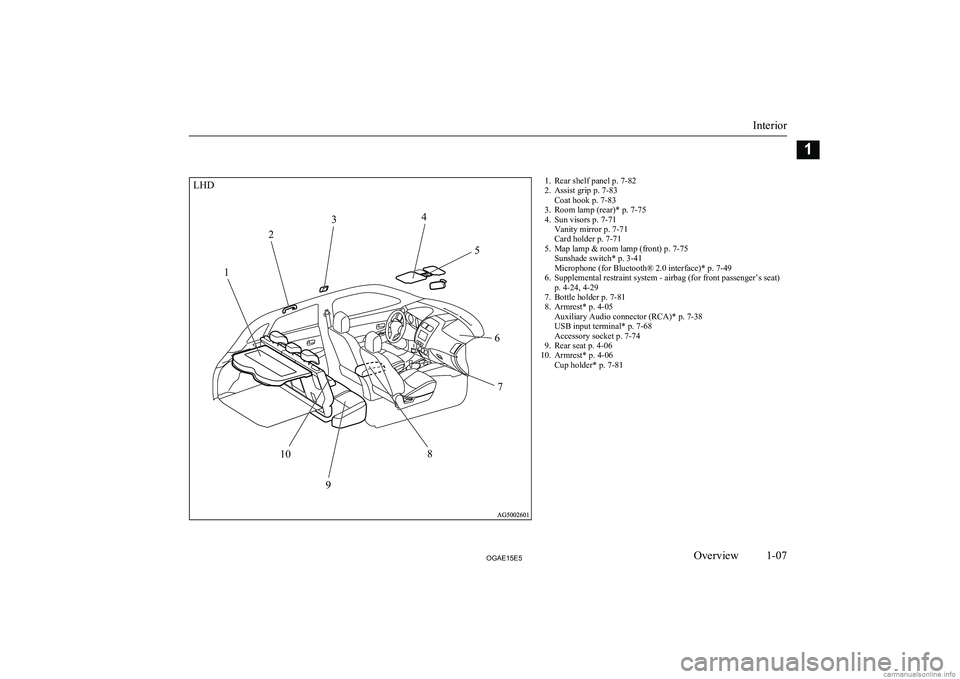
1. Rear shelf panel p. 7-82
2. Assist grip p. 7-83 Coat hook p. 7-83
3. Room lamp (rear)* p. 7-75
4. Sun visors p. 7-71 Vanity mirror p. 7-71
Card holder p. 7-71
5. Map lamp & room lamp (front) p. 7-75 Sunshade switch* p. 3-41
Microphone (for Bluetooth® 2.0 interface)* p. 7-49
6. Supplemental restraint system - airbag (for front passenger’s seat) p. 4-24, 4-29
7. Bottle holder p. 7-81
8. Armrest* p. 4-05 Auxiliary Audio connector (RCA)* p. 7-38
USB input terminal* p. 7-68
Accessory socket p. 7-74
9. Rear seat p. 4-06
10. Armrest* p. 4-06 Cup holder* p. 7-81
Interior
1-07OGAE15E5Overview1LHD1 2
3
4
5
67
8
9
10
Page 11 of 452
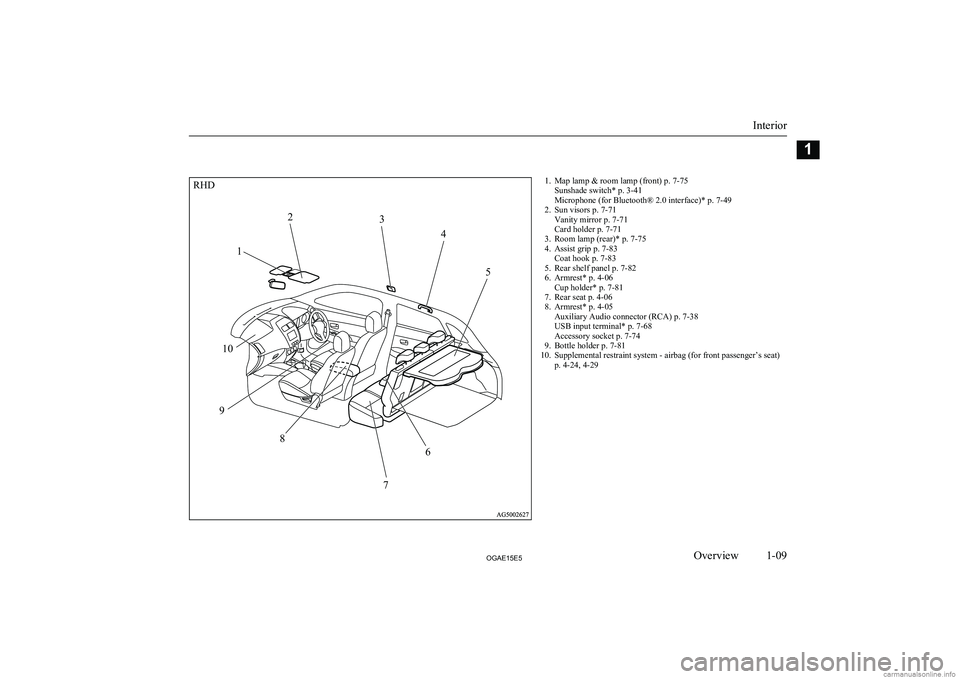
1. Map lamp & room lamp (front) p. 7-75Sunshade switch* p. 3-41
Microphone (for Bluetooth® 2.0 interface)* p. 7-49
2. Sun visors p. 7-71 Vanity mirror p. 7-71
Card holder p. 7-71
3. Room lamp (rear)* p. 7-75
4. Assist grip p. 7-83 Coat hook p. 7-83
5. Rear shelf panel p. 7-82
6. Armrest* p. 4-06 Cup holder* p. 7-81
7. Rear seat p. 4-06
8. Armrest* p. 4-05 Auxiliary Audio connector (RCA) p. 7-38
USB input terminal* p. 7-68
Accessory socket p. 7-74
9. Bottle holder p. 7-81
10. Supplemental restraint system - airbag (for front passenger’s seat) p. 4-24, 4-29
Interior
1-09OGAE15E5Overview1RHD1 2
3
4
5
6
7
8
9 10
Page 142 of 452
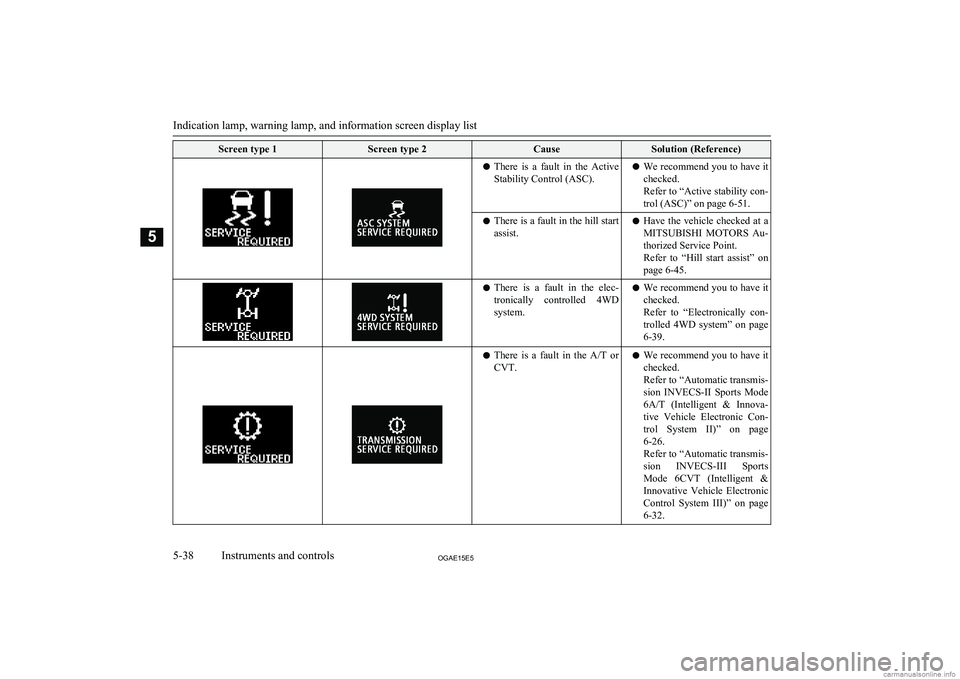
Screen type 1Screen type 2CauseSolution (Reference)lThere is a fault in the Active
Stability Control (ASC).l We recommend you to have it
checked.
Refer to “Active stability con- trol (ASC)” on page 6-51.l There is a fault in the hill start
assist.l Have the vehicle checked at a
MITSUBISHI MOTORS Au-
thorized Service Point.
Refer to “Hill start assist” on
page 6-45.l There is a fault in the elec-
tronically controlled 4WD
system.l We recommend you to have it
checked.
Refer to “Electronically con- trolled 4WD system” on page
6-39.l There is a fault in the
A/T or
CVT.l We recommend you to have it
checked.
Refer to “Automatic transmis-
sion INVECS-II Sports Mode
6A/T (Intelligent & Innova-
tive Vehicle Electronic Con- trol System II)” on page6-26.
Refer to “Automatic transmis-
sion INVECS-III Sports
Mode 6CVT (Intelligent & Innovative Vehicle Electronic
Control System III)” on page
6-32.
Indication lamp, warning lamp, and information screen display list
5-38OGAE15E5Instruments and controls5
Page 169 of 452
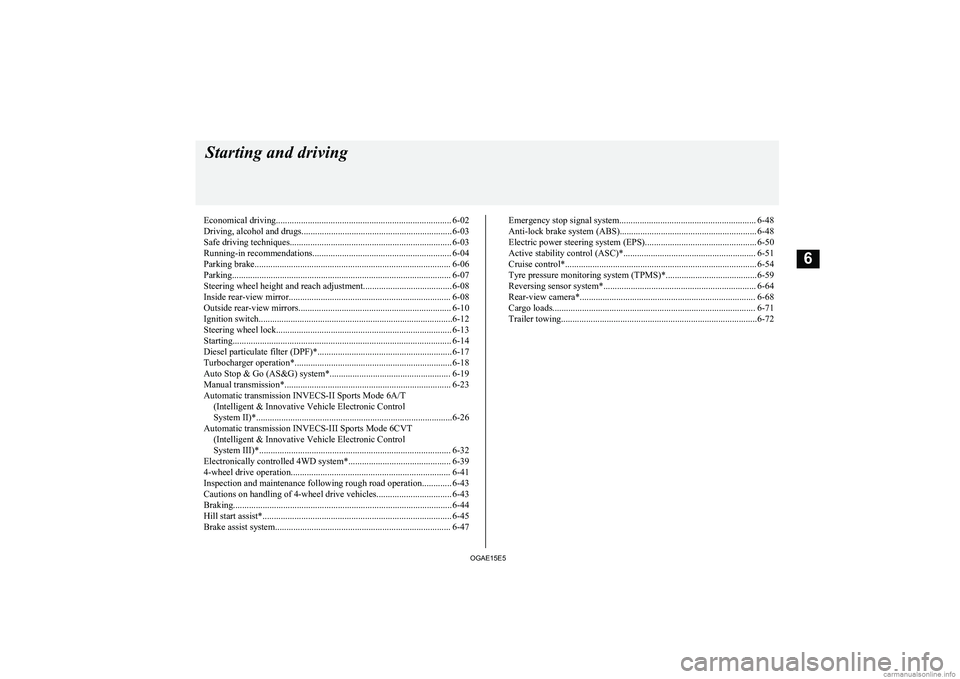
Economical driving............................................................................. 6-02
Driving, alcohol and drugs.................................................................. 6-03
Safe driving techniques....................................................................... 6-03
Running-in recommendations............................................................. 6-04 Parking brake...................................................................................... 6-06
Parking................................................................................................ 6-07
Steering wheel height and reach adjustment....................................... 6-08
Inside rear-view mirror....................................................................... 6-08 Outside rear-view mirrors................................................................... 6-10
Ignition switch.....................................................................................6-12 Steering wheel lock............................................................................. 6-13
Starting................................................................................................ 6-14 Diesel particulate filter (DPF)*........................................................... 6-17Turbocharger operation*..................................................................... 6-18Auto Stop & Go (AS&G) system*..................................................... 6-19
Manual transmission*......................................................................... 6-23 Automatic transmission INVECS-II Sports Mode 6A/T (Intelligent & Innovative Vehicle Electronic Control
System II)*......................................................................................6-26
Automatic transmission INVECS-III Sports Mode 6CVT (Intelligent & Innovative Vehicle Electronic Control
System III)*.................................................................................... 6-32
Electronically controlled 4WD system*............................................. 6-39 4-wheel drive operation...................................................................... 6-41
Inspection and maintenance following rough road operation............. 6-43
Cautions on handling of 4-wheel drive vehicles................................. 6-43
Braking................................................................................................ 6-44
Hill start assist*................................................................................... 6-45
Brake assist system............................................................................. 6-47Emergency stop signal system............................................................ 6-48
Anti-lock brake system (ABS)............................................................ 6-48
Electric power steering system (EPS)................................................. 6-50 Active stability control (ASC)*.......................................................... 6-51Cruise control*.................................................................................... 6-54
Tyre pressure monitoring system (TPMS)*........................................ 6-59 Reversing sensor system*................................................................... 6-64
Rear-view camera*............................................................................. 6-68 Cargo loads......................................................................................... 6-71Trailer towing......................................................................................6-72Starting and driving
OGAE15E56
Page 213 of 452
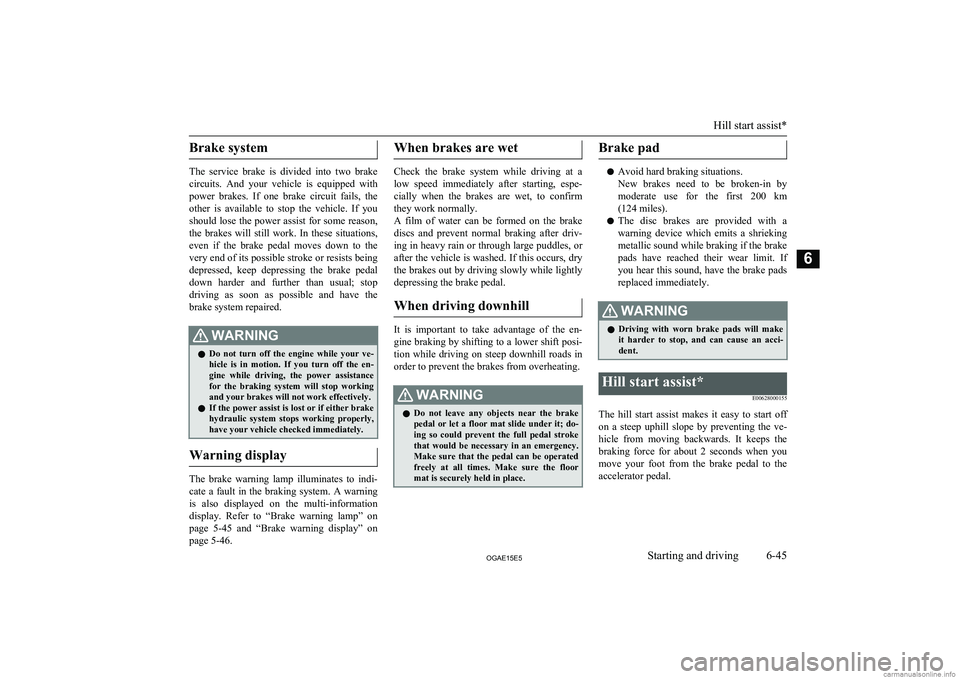
Brake system
The service brake is divided into two brake
circuits. And your vehicle is equipped with
power brakes. If one brake circuit fails, the
other is available to stop the vehicle. If you should lose the power assist for some reason, the brakes will still work. In these situations,
even if the brake pedal moves down to the
very end of its possible stroke or resists being
depressed, keep depressing the brake pedal down harder and further than usual; stop
driving as soon as possible and have the
brake system repaired.
WARNINGl Do not turn off the engine while your ve-
hicle is in motion. If you turn off the en-
gine while driving, the power assistance for the braking system will stop working
and your brakes will not work effectively.
l If the power assist is lost or if either brake
hydraulic system stops working properly, have your vehicle checked immediately.
Warning display
The brake warning lamp illuminates to indi-
cate a fault in the braking system. A warning
is also displayed on the multi-information display. Refer to “Brake warning lamp” on page 5-45 and “Brake warning display” on
page 5-46.
When brakes are wet
Check the brake system while driving at a
low speed immediately after starting, espe- cially when the brakes are wet, to confirmthey work normally.
A film of water can be formed on the brake
discs and prevent normal braking after driv-
ing in heavy rain or through large puddles, or after the vehicle is washed. If this occurs, dry
the brakes out by driving slowly while lightly depressing the brake pedal.
When driving downhill
It is important to take advantage of the en-
gine braking by shifting to a lower shift posi- tion while driving on steep downhill roads in order to prevent the brakes from overheating.
WARNINGl Do not leave any objects near the brake
pedal or let a floor mat slide under it; do- ing so could prevent the full pedal stroke
that would be necessary in an emergency. Make sure that the pedal can be operatedfreely at all times. Make sure the floor mat is securely held in place.Brake pad
l Avoid hard braking situations.
New brakes need to be broken-in by
moderate use for the first 200 km (124 miles).
l The disc brakes are provided with a
warning device which emits a shrieking
metallic sound while braking if the brake pads have reached their wear limit. Ifyou hear this sound, have the brake padsreplaced immediately.
WARNINGl Driving with worn brake pads will make
it harder to stop, and can cause an acci-
dent.Hill start assist*
E00628000155
The hill start assist makes it easy to start offon a steep uphill slope by preventing the ve-
hicle from moving backwards. It keeps the
braking force for about 2 seconds when you move your foot from the brake pedal to the
accelerator pedal.
Hill start assist*
6-45OGAE15E5Starting and driving6
Page 214 of 452
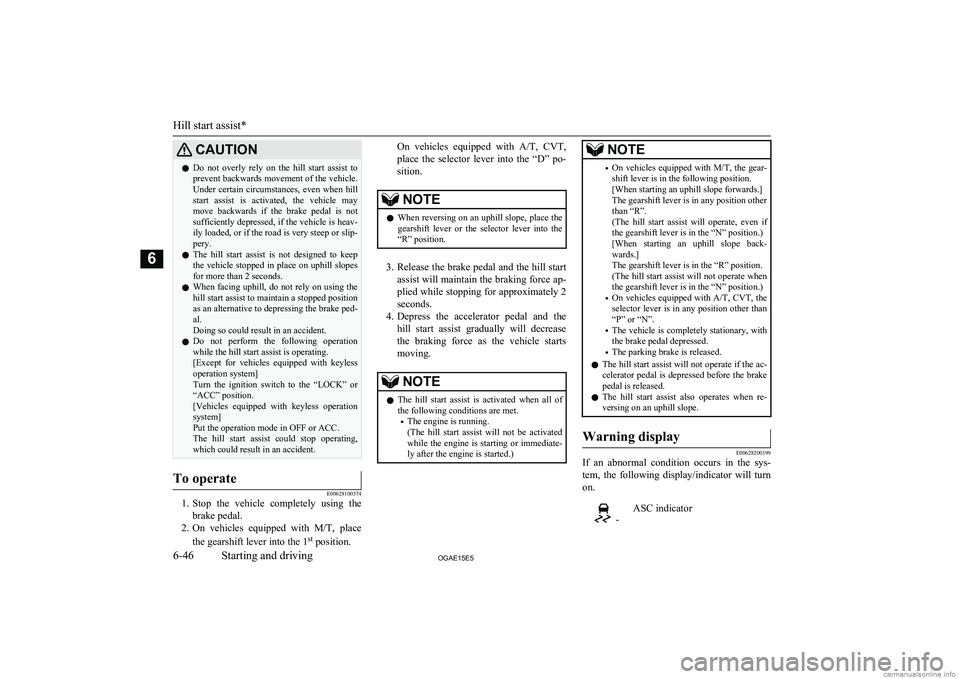
CAUTIONlDo not overly rely on the hill start assist to
prevent backwards movement of the vehicle. Under certain circumstances, even when hill
start assist is activated, the vehicle may
move backwards if the brake pedal is not sufficiently depressed, if the vehicle is heav-
ily loaded, or if the road is very steep or slip- pery.
l The hill start assist is not designed to keep
the vehicle stopped in place on uphill slopes for more than 2 seconds.
l When facing uphill, do not rely on using the
hill start assist to maintain a stopped position as an alternative to depressing the brake ped-
al.
Doing so could result in an accident.
l Do not perform the following operation
while the hill start assist is operating.
[Except for vehicles equipped with keyless operation system]
Turn the ignition switch to the “LOCK” or
“ACC” position.
[Vehicles equipped with keyless operation
system]
Put the operation mode in OFF or ACC.
The hill start assist could stop operating, which could result in an accident.To operate
E00628100374
1. Stop the vehicle completely using the
brake pedal.
2. On vehicles equipped with M/T, place
the gearshift lever into the 1 st
position.
On vehicles equipped with A/T, CVT,
place the selector lever into the “D” po- sition.NOTEl When reversing on an uphill slope, place the
gearshift lever or the selector lever into the
“R” position.
3. Release the brake pedal and the hill start
assist will maintain the braking force ap-
plied while stopping for approximately 2 seconds.
4. Depress the accelerator pedal and the
hill start assist gradually will decrease the braking force as the vehicle startsmoving.
NOTEl The hill start assist is activated when all of
the following conditions are met.
• The engine is running.
(The hill start assist will not be activated
while the engine is starting or immediate-
ly after the engine is started.)NOTE• On vehicles equipped with
M/T, the gear-
shift lever is in the following position.
[When starting an uphill slope forwards.]
The gearshift lever is in any position other
than “R”.
(The hill start assist will operate, even if the gearshift lever is in the “N” position.)
[When starting an uphill slope back-
wards.]
The gearshift lever is in the “R” position.
(The hill start assist will not operate when
the gearshift lever is in the “N” position.)
• On vehicles equipped with
A/T, CVT, the
selector lever is in any position other than “P” or “N”.
• The vehicle is completely stationary, with
the brake pedal depressed.
• The parking brake is released.
l The hill start assist will not operate if the ac-
celerator pedal is depressed before the brake pedal is released.
l The hill start assist also operates when re-
versing on an uphill slope.Warning display
E00628200199
If an abnormal condition occurs in the sys-
tem, the following display/indicator will turn
on.
-ASC indicator
Hill start assist*
6-46OGAE15E5Starting and driving6
Page 215 of 452
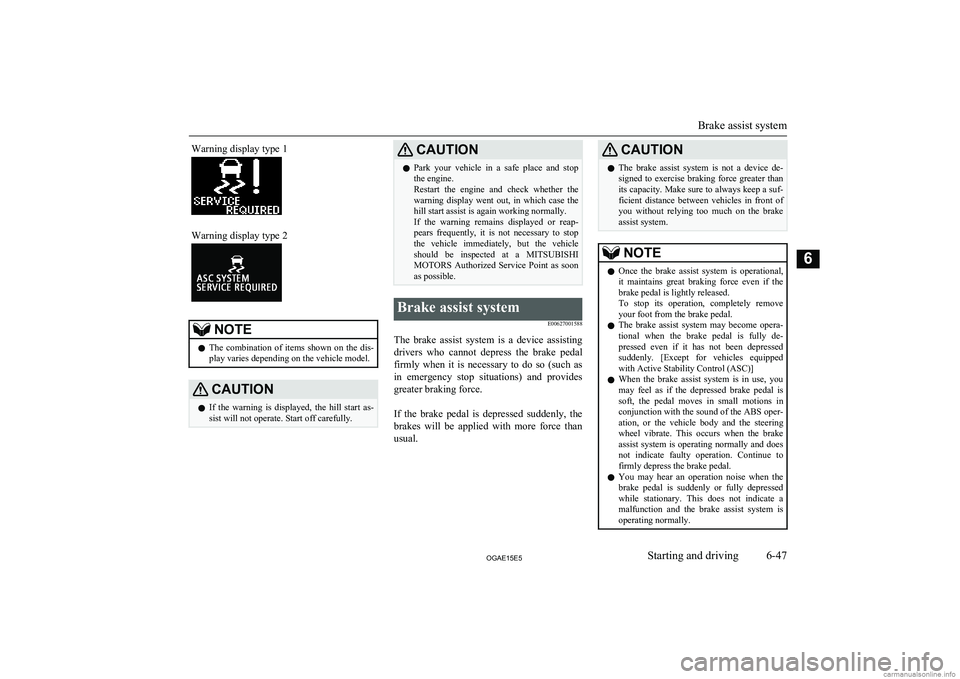
Warning display type 1Warning display type 2NOTElThe combination of items shown on the dis-
play varies depending on the vehicle model.CAUTIONl If the warning is displayed, the hill start as-
sist will not operate. Start off carefully.CAUTIONl Park your vehicle in a safe place and stop
the engine.
Restart the engine and check whether the warning display went out, in which case the
hill start assist is again working normally.
If the warning remains displayed or reap-
pears frequently, it is not necessary to stop the vehicle immediately, but the vehicle
should be inspected at a MITSUBISHI
MOTORS Authorized Service Point as soon
as possible.Brake assist system
E00627001588
The brake assist system is a device assistingdrivers who cannot depress the brake pedalfirmly when it is necessary to do so (such as
in emergency stop situations) and provides
greater braking force.
If the brake pedal is depressed suddenly, the brakes will be applied with more force than
usual.
CAUTIONl The brake assist system is not a device de-
signed to exercise braking force greater than its capacity. Make sure to always keep a suf-
ficient distance between vehicles in front of
you without relying too much on the brake
assist system.NOTEl Once the brake assist system is operational,
it maintains great braking force even if the
brake pedal is lightly released.
To stop its operation, completely remove
your foot from the brake pedal.
l The brake assist system may become opera-
tional when the brake pedal is fully de- pressed even if it has not been depressed suddenly. [Except for vehicles equipped
with Active Stability Control (ASC)]
l When the brake assist system is in use, you
may feel as if the depressed brake pedal issoft, the pedal moves in small motions inconjunction with the sound of the ABS oper- ation, or the vehicle body and the steering
wheel vibrate. This occurs when the brake
assist system is operating normally and does not indicate faulty operation. Continue to
firmly depress the brake pedal.
l You may hear an operation noise when the
brake pedal is suddenly or fully depressed
while stationary. This does not indicate a malfunction and the brake assist system is
operating normally.
Brake assist system
6-47OGAE15E5Starting and driving6
Page 216 of 452
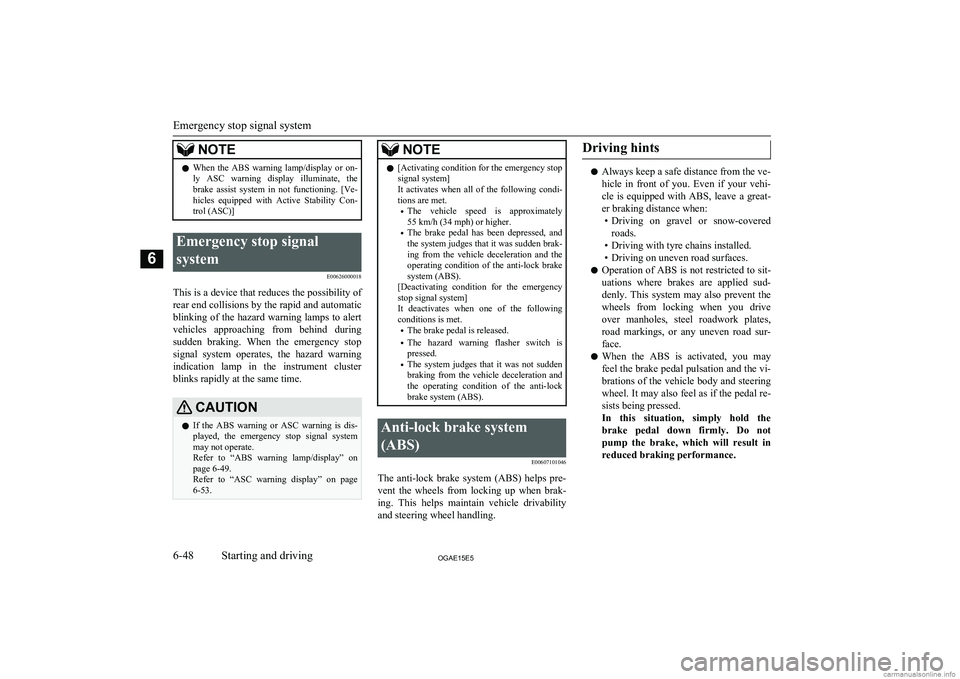
NOTElWhen the ABS warning lamp/display or on-
ly ASC warning display illuminate, the
brake assist system in not functioning. [Ve- hicles equipped with Active Stability Con-
trol (ASC)]Emergency stop signal
system E00626000018
This is a device that reduces the possibility ofrear end collisions by the rapid and automatic blinking of the hazard warning lamps to alert
vehicles approaching from behind during sudden braking. When the emergency stop
signal system operates, the hazard warning indication lamp in the instrument cluster
blinks rapidly at the same time.
CAUTIONl If the ABS warning or ASC warning is dis-
played, the emergency stop signal system may not operate.
Refer to “ABS warning lamp/display” on
page 6-49.
Refer to “ASC warning display” on page 6-53.NOTEl [Activating condition for the emergency stop
signal system]
It activates when all of the following condi-
tions are met.
• The vehicle speed is approximately
55 km/h (34 mph) or higher.
• The brake pedal has been depressed, and
the system judges that it was sudden brak- ing from the vehicle deceleration and theoperating condition of the anti-lock brake
system (ABS).
[Deactivating condition for the emergency
stop signal system]
It deactivates when one of the following conditions is met.
• The brake pedal is released.
• The hazard warning flasher switch is
pressed.
• The system judges that it was not sudden
braking from the vehicle deceleration and
the operating condition of the anti-lock
brake system (ABS).Anti-lock brake system
(ABS) E00607101046
The anti-lock brake system (ABS) helps pre-vent the wheels from locking up when brak-
ing. This helps maintain vehicle drivability and steering wheel handling.
Driving hints
l Always keep a safe distance from the ve-
hicle in front of you. Even if your vehi- cle is equipped with ABS, leave a great-
er braking distance when: • Driving on gravel or snow-covered
roads.
• Driving with tyre chains installed.
• Driving on uneven road surfaces.
l Operation of ABS is not restricted to sit-
uations where brakes are applied sud-
denly. This system may also prevent the
wheels from locking when you drive over manholes, steel roadwork plates, road markings, or any uneven road sur-
face.
l When the ABS is activated, you may
feel the brake pedal pulsation and the vi- brations of the vehicle body and steering
wheel. It may also feel as if the pedal re-
sists being pressed.
In this situation, simply hold the brake pedal down firmly. Do not
pump the brake, which will result in reduced braking performance.Emergency stop signal system
6-48OGAE15E5Starting and driving6
Page 218 of 452
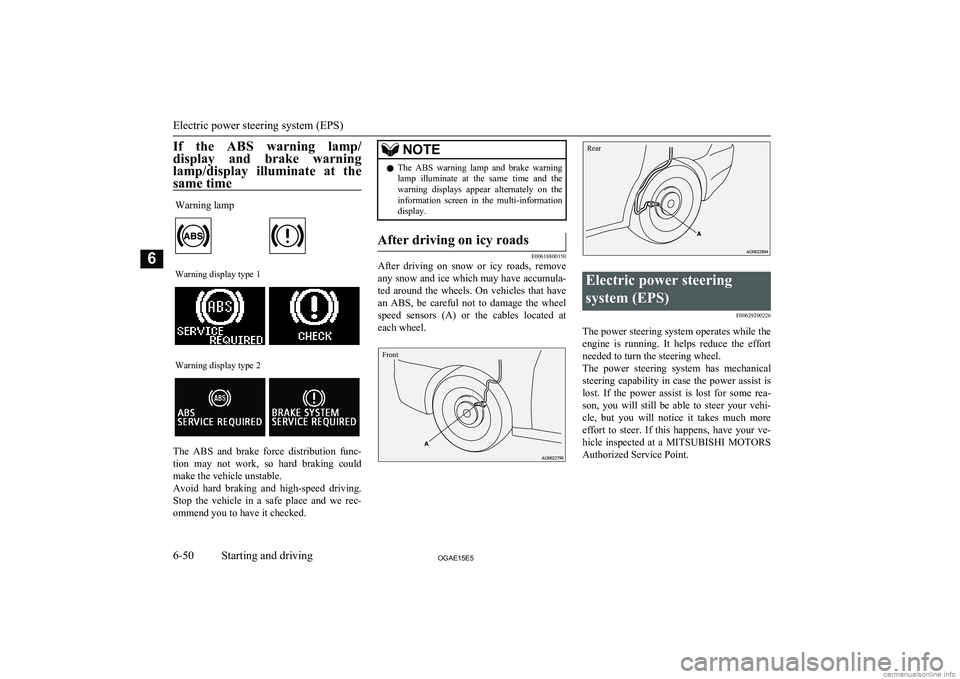
If the ABS warning lamp/display and brake warning
lamp/display illuminate at the same timeWarning lampWarning display type 1Warning display type 2
The ABS and brake force distribution func- tion may not work, so hard braking could
make the vehicle unstable.
Avoid hard braking and high-speed driving.
Stop the vehicle in a safe place and we rec-
ommend you to have it checked.
NOTEl The ABS warning lamp and brake warning
lamp illuminate at the same time and the
warning displays appear alternately on the information screen in the multi-informationdisplay.After driving on icy roads
E00618800150
After driving on snow or icy roads, remove
any snow and ice which may have accumula-
ted around the wheels. On vehicles that have
an ABS, be careful not to damage the wheel
speed sensors (A) or the cables located at each wheel.
FrontRear
Electric power steering
system (EPS) E00629200226
The power steering system operates while theengine is running. It helps reduce the effort
needed to turn the steering wheel.
The power steering system has mechanical
steering capability in case the power assist is lost. If the power assist is lost for some rea-
son, you will still be able to steer your vehi-
cle, but you will notice it takes much more effort to steer. If this happens, have your ve-hicle inspected at a MITSUBISHI MOTORS
Authorized Service Point.
Electric power steering system (EPS)
6-50OGAE15E5Starting and driving6
Page 232 of 452
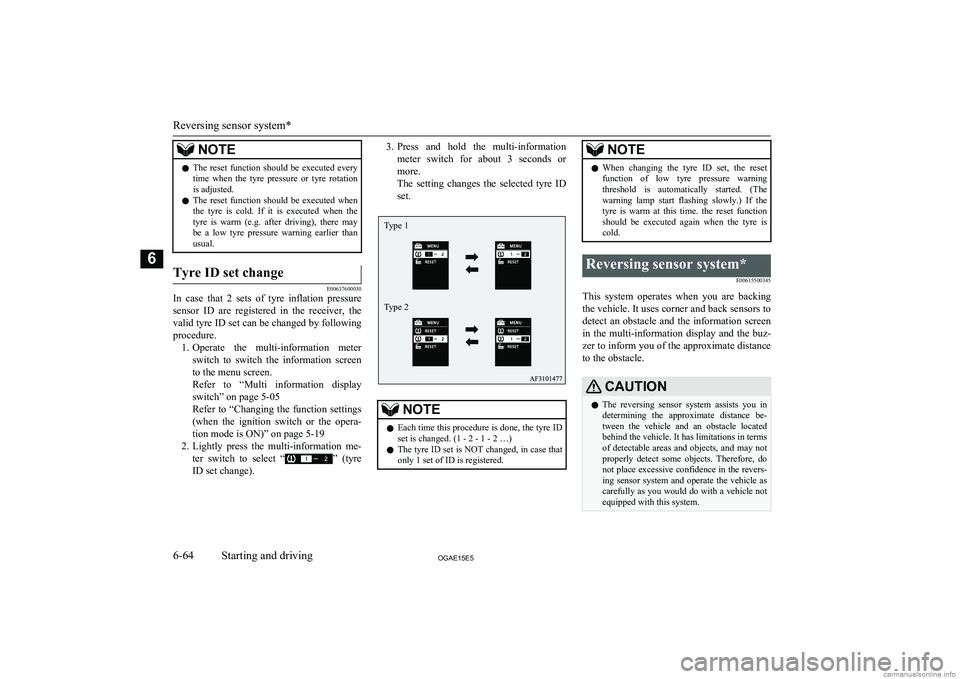
NOTElThe reset function should be executed every
time when the tyre pressure or tyre rotationis adjusted.
l The reset function should be executed when
the tyre is cold. If it is executed when the
tyre is warm (e.g. after driving), there may be a low tyre pressure warning earlier than
usual.Tyre ID set change
E00637600030
In case that 2 sets of tyre inflation pressure
sensor ID are registered in the receiver, the
valid tyre ID set can be changed by following
procedure. 1. Operate the multi-information meter
switch to switch the information screen
to the menu screen.
Refer to “Multi information display switch” on page 5-05
Refer to “Changing the function settings (when the ignition switch or the opera-
tion mode is ON)” on page 5-19
2. Lightly press the multi-information me-
ter switch to select “
” (tyre
ID set change).
3. Press and hold the multi-information
meter switch for about 3 seconds or more.
The setting changes the selected tyre ID set.NOTEl Each time this procedure is done, the tyre ID
set is changed. (1 - 2 - 1 - 2 …)
l The tyre ID set is NOT changed, in case that
only 1 set of ID is registered.NOTEl When changing the tyre ID set, the reset
function of low tyre pressure warning threshold is automatically started. (The
warning lamp start flashing slowly.) If the
tyre is warm at this time. the reset function should be executed again when the tyre iscold.Reversing sensor system*
E00615500345
This system operates when you are backingthe vehicle. It uses corner and back sensors to detect an obstacle and the information screen
in the multi-information display and the buz-
zer to inform you of the approximate distance to the obstacle.
CAUTIONl The reversing sensor system assists you in
determining the approximate distance be-
tween the vehicle and an obstacle located behind the vehicle. It has limitations in terms
of detectable areas and objects, and may not
properly detect some objects. Therefore, do not place excessive confidence in the revers-
ing sensor system and operate the vehicle as carefully as you would do with a vehicle not equipped with this system.
Reversing sensor system*
6-64OGAE15E5Starting and driving6 Type 1
Type 2